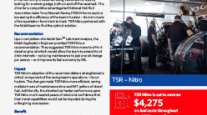Senior Reporter
US House Approves DERA Grants Legislation

[Stay on top of transportation news: Get TTNews in your inbox.]
Legislation that would reauthorize a grant program meant to improve air quality by reducing diesel emissions was advanced by the U.S. House of Representatives on Sept. 9.
Lawmakers voted 295 to 114 to approve the Diesel Emissions Reduction Act, a reauthorization of the U.S. Environmental Protection Agency program through fiscal 2024. Twenty-three members of the House did not vote.
The DERA program is designed to facilitate the freight industry’s upgrade of diesel engines that operate along waterways, rails and commercial corridors. Its objective is to update engines to have them comply with pollution standards.

Matsui
“No person, no matter their age, race or zip code, deserves to live with a health condition resulting from poor air quality,” said Rep. Doris Matsui (D-Calif.), the measure’s sponsor, and a member of the Energy and Commerce Committee. “For us to realize that goal, we need to work together in an all-hands-on-deck approach to reduce air pollution and improve public health, and today’s vote is an example of just that,”
“This program is a bipartisan, commonsense approach to improving air quality by reducing harmful emissions from older and dirtier diesel engines,” added Rep. Billy Long (R-Mo.), a cosponsor.
On April 10, a Senate panel advanced its version of the program’s reauthorization. Floor managers in the upper chamber have yet to schedule a vote on the bill, sponsored by Delaware Sen. Tom Carper.
I was happy to see @DorisMatsui and I's bipartisan Diesel Emissions Reduction Act (DERA) pass the House yesterday.
Since 2008 DERA has awarded funds to upgrade over 67,300 old diesel engines across America, greatly reducing emissions from diesel-operated vehicles and machinery. pic.twitter.com/6CzNgy9pC0 — U.S. Rep. Billy Long (@USRepLong) September 10, 2019
The top Democrat on the Environment and Public Works Committee, Carper praised the action in the House.
“We’re one step closer to making sure this innovative program continues to drive both clean air progress and job growth in American manufacturing,” the senator said in a statement. “For almost 15 years now, the competitive grants administered through the DERA program have made it easier to breathe in communities around the country by replacing old, inefficient diesel engines with cleaner, American-made technology.”
More than a decade ago, Carper authored the DERA legislation with former Ohio Republican Sen. George Voinovich.
EPW Chairman John Barrasso (R-Wyo.), who included DERA reauthorizing provisions in a committee-passed infrastructure policy measure, added, “It’s critical that every community can take part in a program that helps keep our air clean and our public equipment running efficiently.”
Older diesel engines have demonstrated the capacity to emit higher amounts of pollution, the agency warned.

About $40 million in grants for the clean diesel funding assistance program are expected to be awarded, according to EPA.
“Many DERA projects have made health and environmental impacts in socially and economically vulnerable areas. Goods movement projects are especially beneficial because they tend to take place in communities that are disproportionately impacted by higher levels of diesel exhaust, such as those near ports, rail yards and distribution centers. Clean diesel projects reduce exposure for people living in these communities, and the improved air quality provides immediate health benefits,” the agency indicated in a recent report to Congress.
The American Association of Port Authorities is among the stakeholders that have endorsed the legislation. The group stated earlier this year, “This funding has been key to incentivizing and expanding port environmental programs to improve air quality impacted by port operations.”




